GALLUP NEWS SERVICE
PRINCETON, NJ -- A new USA Today/Gallup poll, conducted Friday, July 28, through Sunday, July 30, shows a continuation of mixed sentiments about what the U.S. government should do regarding the most recent violent conflict in the Middle East. The data show that a majority of Americans overall are not pressing for the U.S. to be doing more in the crisis, nor that most Americans believe that the United States should press for an immediate ceasefire. Instead, the data show Americans are most likely to either believe that the United States is doing about the right amount or too much in terms of the crisis, and that Americans are most likely to say that the United States should not get involved at all in calling for a ceasefire, or should call for a ceasefire only after the current conflict has continued for a while longer.
Additionally, more than 8 in 10 Americans say that the Israeli military action is justified, even though the majority of that group believes that the Israelis have gone too far in terms of the extent of that action.
Republicans are somewhat more likely than Democrats to say that the United States is doing about the right amount to help resolve the current conflict, and that the U.S. government should call for a ceasefire only after the conflict has played out further. Even less than half of Democrats, however, say that the United States should be pressing for an immediate ceasefire. Overall, a majority of Republicans say that U.S. support for Israel is about right, while Democrats are more likely to say that the United States supports Israel too much.
The USA Today/Gallup poll was conducted July 28-30, a time period which included the initial news reports of the Israeli bombing of Qana, which killed 54 civilians (37 of which are reported to be children). Thus, the survey results may not reflect the full impact of this incident on American public opinion.
What do the American people want their elected representatives to do in the current situation?
As of the time of this survey, there is no public mandate for the United States to do more to help resolve the Israeli-Hezbollah conflict. Only about one-third of Americans believe the country is not doing enough to resolve the conflict. A little more than 4 in 10 say the United States is doing the right amount, while about 20% of Americans say the United States is doing too much.
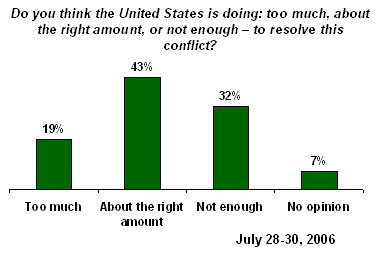
Americans are also divided on what precise actions the United States should take at this point.
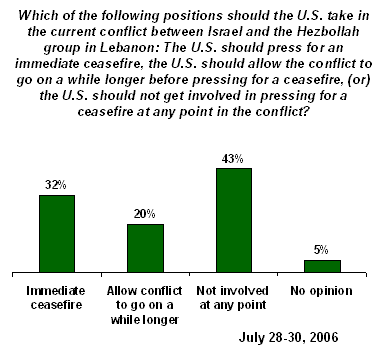
Just one-third of Americans want the United States to push for an immediate ceasefire; a little more than 4 in 10 want the U.S. government to not do anything, while 20% say the United States should allow the conflict to go on a while longer before advocating a ceasefire.
The bottom line: Despite criticisms from some quarters that the U.S. government is not doing enough to intervene and resolve the Middle East conflict, these data show no evidence that the majority of the American public agrees. Less than half say that the United States should be doing more to resolve the conflict, and less than half say that the United States should be pressing for an immediate ceasefire.
There are political differences in response to both of these questions.
Republicans are much more likely than independents or Democrats to believe that the United States is doing about the right amount to resolve this crisis.
But while Democrats are concomitantly less likely to believe that the U.S. government is doing the right thing, there is no consensus among Democrats about what the United States should be doing. Democrats are slightly more likely than average to believe that the United States is doing too much, and are also more likely than average to believe that the United States is not doing enough.
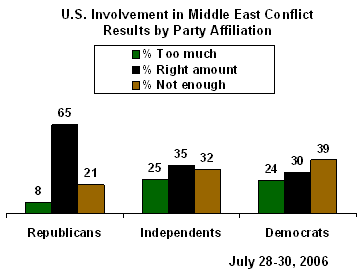
There are differences by party in response to the poll question asking what the U.S. government should do at this point, but they do not suggest that partisans have diametrically different perspectives on the issue.
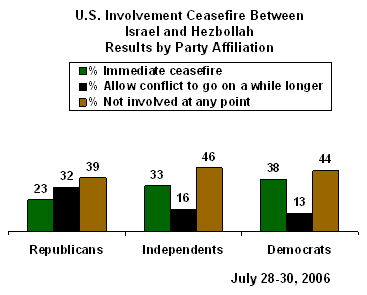
- Democrats are more likely than Republicans to support the immediate press for a ceasefire, but even among Democrats this is only a minority response.
- Republicans are more likely than Democrats to support the idea of letting the fighting continue for a while longer before pressing for a ceasefire; again, this is only a minority response among Republicans.
- There is surprisingly little difference between Republicans and Democrats in terms of the belief that the United States should not get involved at all.
Twenty-seven percent of Americans claim to be following the news of the conflict in the Middle East very closely (discussed in more detail below). This group is significantly more likely than those following the news less closely to favor a proactive role for the United States. But as is true of the sample as a whole, those following the news very closely and who believe that the United States should be involved are somewhat more likely to say that the United States should press for an immediate ceasefire than to say that the United States should wait before seeking a ceasefire:
Which of the following positions should the U.S. take in the current conflict between Israel and the Hezbollah group in Lebanon -- [ROTATED: the U.S. should press for an immediate ceasefire, the U.S. should allow the conflict to go on a while longer before pressing for a ceasefire, (or) the U.S. should not get involved in pressing for a ceasefire at any point in the conflict]?
|
Total |
Very |
Somewhat |
Not close at all |
|
|
% |
% |
% |
% |
|
|
Immediate cease fire |
32 |
38 |
30 |
29 |
|
Allow conflict to go on for a while |
20 |
26 |
20 |
14 |
|
Not involved at any point |
43 |
32 |
48 |
46 |
How much attention are Americans paying to the violence in the Middle East?
Gallup has long used a standard measure to gauge the attention that Americans are paying to news stories of note: "How closely have you been following the news about [DESCRIPTION OF NEWS STORY]?"
By this measure, 67% of Americans at the moment say they are following the news about "attacks going on in Israel and Lebanon" very or somewhat closely. This is a slightly lower level of attention for this news story than Gallup measured last week.
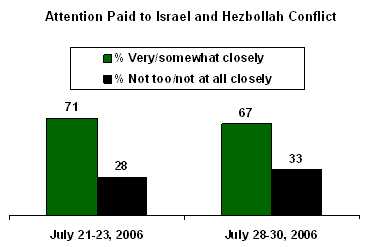
The 67% of Americans saying they are closely following this news story represents an above average level of attention, but does not rank near the top of the list of all news stories measured by Gallup on this question over the last 14 years.
By way of comparison, the 67% is similar to the level of attention paid to such news stories as the Bush administration wiretapping Americans (2006), the Terry Schiavo case (2005), and the disappearance of Chandra Levy (2001).
Gallup has measured attention being paid to the Middle East at other times -- in 1997, 2000, 2002, and 2003. The current 67% is lower than any of the four previous readings measured by Gallup since 2000.
How closely would you say you have followed the recent situation in the Middle East involving Israel and the Palestinians -- very closely, somewhat closely, not too closely, or not at all?
|
Very |
Somewhat |
Not too |
Not |
No |
|
|
% |
% |
% |
% |
% |
|
|
2003 Jun 12-15 |
25 |
49 |
21 |
5 |
* |
|
2003 May 19-21 |
24 |
48 |
21 |
7 |
-- |
|
2002 Apr 5-7 |
34 |
45 |
18 |
3 |
* |
|
2000 Oct 13-14 |
30 |
39 |
18 |
11 |
2 |
|
1997 Aug 12-13 ^ |
6 |
23 |
36 |
35 |
* |
|
|
|
|
|
|
|
|
^ Based on half sample. |
|||||
|
* Less than 0.5% |
|||||
What are Americans' attitudes about the actions being taken by Israel in the current situation?
Americans continue to have mixed feelings about the military action being taken by Israel in the current conflict. At this point, 81% of Americans believe Israel's military actions are justified, about the same as the percentage Gallup found one week ago.
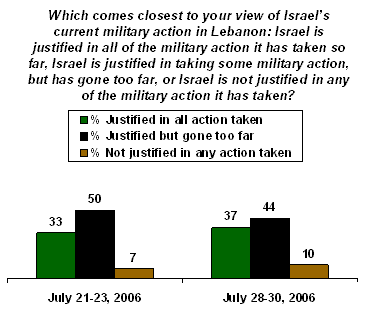
A plurality of Americans believe that while the basis for military action on the part of Israel may be justified, that action has gone too far. Only a very small percent of Americans (10%) say that Israel's military action is not justified.
Republicans are much more likely than Democrats to believe that Israel is justified in all of the military action it has taken so far.
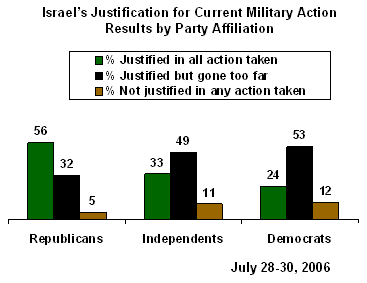
This is not surprising, given previous analyses showing that Republicans are more likely than Democrats in general to be sympathetic to Israel.
The results show that a slight plurality of Americans believe that U.S. support for Israel is about right, while a slightly smaller percentage say that the United States supports Israel too much. Few Americans say that the U.S. government offers too little support for Israel.
These results are remarkably similar to the pattern observed in recent years (with the exception of an October 2001 poll in which a higher percentage said that support for Israel was about right).
Do you think the United States supports [ITEM A READ FIRST, THEN ITEMS B-C READ IN RANDOM ORDER] -- [ROTATED: too much, about the right amount, or too little]?
A. Israel
|
Too much |
Right amount |
Too little |
No opinion |
|
|
% |
% |
% |
% |
|
|
2006 Jul 28-30 |
38 |
44 |
11 |
8 |
|
|
|
|
|
|
|
2003 May 30-Jun 1 |
32 |
48 |
12 |
8 |
|
2002 Jun 7-8 |
43 |
40 |
10 |
7 |
|
2002 Apr 5-7 |
35 |
49 |
10 |
6 |
|
2002 Mar 1-3 |
38 |
48 |
11 |
3 |
|
2001 Dec 14-16 ^ |
31 |
51 |
10 |
8 |
|
2001 Oct 19-21 |
29 |
58 |
9 |
4 |
|
|
|
|
|
|
|
^ Asked of a half sample |
||||
Fifty-seven percent of Republicans say that the United States supports Israel about the right amount, compared to 39% of independents and 36% of Democrats who feel this way. Half of Democrats say that the United States supports Israel too much.
Survey Methods
The latest results are based on telephone interviews with a randomly selected national sample of 1,007 adults, aged 18 and older, conducted July 28-30, 2006. For results based on this sample, one can say with 95% confidence that the maximum error attributable to sampling and other random effects is ±3 percentage points. In addition to sampling error, question wording and practical difficulties in conducting surveys can introduce error or bias into the findings of public opinion polls.